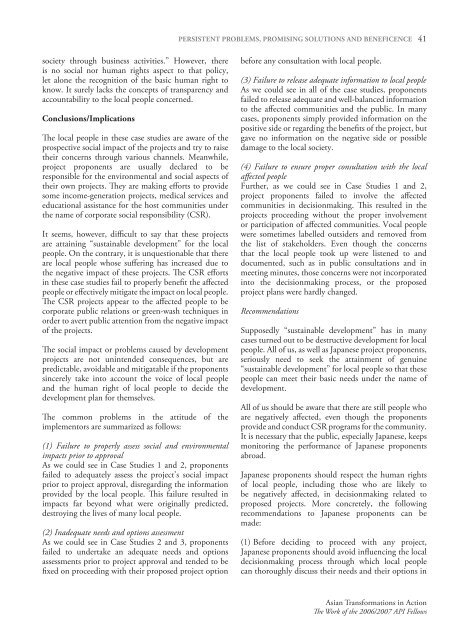Asian Transformations in Action - Api-fellowships.org
Asian Transformations in Action - Api-fellowships.org
Asian Transformations in Action - Api-fellowships.org
You also want an ePaper? Increase the reach of your titles
YUMPU automatically turns print PDFs into web optimized ePapers that Google loves.
PERSISTENT PROBLEMS, PROMISING SOLUTIONS AND BENEFICENCE41society through bus<strong>in</strong>ess activities.” However, thereis no social nor human rights aspect to that policy,let alone the recognition of the basic human right toknow. It surely lacks the concepts of transparency andaccountability to the local people concerned.Conclusions/ImplicationsThe local people <strong>in</strong> these case studies are aware of theprospective social impact of the projects and try to raisetheir concerns through various channels. Meanwhile,project proponents are usually declared to beresponsible for the environmental and social aspects oftheir own projects. They are mak<strong>in</strong>g efforts to providesome <strong>in</strong>come-generation projects, medical services andeducational assistance for the host communities underthe name of corporate social responsibility (CSR).It seems, however, difficult to say that these projectsare atta<strong>in</strong><strong>in</strong>g “susta<strong>in</strong>able development” for the localpeople. On the contrary, it is unquestionable that thereare local people whose suffer<strong>in</strong>g has <strong>in</strong>creased due tothe negative impact of these projects. The CSR efforts<strong>in</strong> these case studies fail to properly benefit the affectedpeople or effectively mitigate the impact on local people.The CSR projects appear to the affected people to becorporate public relations or green-wash techniques <strong>in</strong>order to avert public attention from the negative impactof the projects.The social impact or problems caused by developmentprojects are not un<strong>in</strong>tended consequences, but arepredictable, avoidable and mitigatable if the proponentss<strong>in</strong>cerely take <strong>in</strong>to account the voice of local peopleand the human right of local people to decide thedevelopment plan for themselves.The common problems <strong>in</strong> the attitude of theimplementors are summarized as follows:(1) Failure to properly assess social and environmentalimpacts prior to approvalAs we could see <strong>in</strong> Case Studies 1 and 2, proponentsfailed to adequately assess the project’s social impactprior to project approval, disregard<strong>in</strong>g the <strong>in</strong>formationprovided by the local people. This failure resulted <strong>in</strong>impacts far beyond what were orig<strong>in</strong>ally predicted,destroy<strong>in</strong>g the lives of many local people.(2) Inadequate needs and options assessmentAs we could see <strong>in</strong> Case Studies 2 and 3, proponentsfailed to undertake an adequate needs and optionsassessments prior to project approval and tended to befixed on proceed<strong>in</strong>g with their proposed project optionbefore any consultation with local people.(3) Failure to release adequate <strong>in</strong>formation to local peopleAs we could see <strong>in</strong> all of the case studies, proponentsfailed to release adequate and well-balanced <strong>in</strong>formationto the affected communities and the public. In manycases, proponents simply provided <strong>in</strong>formation on thepositive side or regard<strong>in</strong>g the benefits of the project, butgave no <strong>in</strong>formation on the negative side or possibledamage to the local society.(4) Failure to ensure proper consultation with the localaffected peopleFurther, as we could see <strong>in</strong> Case Studies 1 and 2,project proponents failed to <strong>in</strong>volve the affectedcommunities <strong>in</strong> decisionmak<strong>in</strong>g. This resulted <strong>in</strong> theprojects proceed<strong>in</strong>g without the proper <strong>in</strong>volvementor participation of affected communities. Vocal peoplewere sometimes labelled outsiders and removed fromthe list of stakeholders. Even though the concernsthat the local people took up were listened to anddocumented, such as <strong>in</strong> public consultations and <strong>in</strong>meet<strong>in</strong>g m<strong>in</strong>utes, those concerns were not <strong>in</strong>corporated<strong>in</strong>to the decisionmak<strong>in</strong>g process, or the proposedproject plans were hardly changed.RecommendationsSupposedly “susta<strong>in</strong>able development” has <strong>in</strong> manycases turned out to be destructive development for localpeople. All of us, as well as Japanese project proponents,seriously need to seek the atta<strong>in</strong>ment of genu<strong>in</strong>e“susta<strong>in</strong>able development” for local people so that thesepeople can meet their basic needs under the name ofdevelopment.All of us should be aware that there are still people whoare negatively affected, even though the proponentsprovide and conduct CSR programs for the community.It is necessary that the public, especially Japanese, keepsmonitor<strong>in</strong>g the performance of Japanese proponentsabroad.Japanese proponents should respect the human rightsof local people, <strong>in</strong>clud<strong>in</strong>g those who are likely tobe negatively affected, <strong>in</strong> decisionmak<strong>in</strong>g related toproposed projects. More concretely, the follow<strong>in</strong>grecommendations to Japanese proponents can bemade:(1) Before decid<strong>in</strong>g to proceed with any project,Japanese proponents should avoid <strong>in</strong>fluenc<strong>in</strong>g the localdecisionmak<strong>in</strong>g process through which local peoplecan thoroughly discuss their needs and their options <strong>in</strong><strong>Asian</strong> <strong>Transformations</strong> <strong>in</strong> <strong>Action</strong>The Work of the 2006/2007 API Fellows
















